Parker Homestead Hosts Vintage Game
By Jay Cook. Photos by Ottie Lynne Paterson.
LITTLE SILVER – Chants of “Moose, Moose, Moose!” roared out from the Monmouth Furnace Base Ball Club’s dugout as starting catcher Frank Siracusa emerged with his willow in hand. As he strolled to the dish for his first at-bat, Chesapeake Nine’s pitcher “Silver Fox” began his underhand windup, reminiscent of a mid-19th century hurler’s motion to home plate.
Adorned in black caps, black cravats, unseasonably long sleeve shirts and tan pants, Monmouth Furnace, the baseball team established out of Allaire Village, hosted the Chesapeake Nine of Baltimore for a game of 1864-style baseball.
The game took place on June 12 at Sickles Field, and was run in conjunction with the Parker Homestead, a historical farmhouse dating back to the 17th century. “My great grandmother was a Parker, that’s my relationship, and so since 1667 this property has been here,” said Bob Sickles, owner of Sickles Market and president of The Parker Homestead-1665, a non-profit organization.
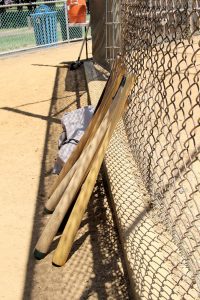
“We’ve been a team for three years,” said Russ McIver, the captain of the Monmouth Furnace Base Ball Club. “Prior to this year we were called the Bog Iron Boys of Allaire Village, but then we changed our name to the Monmouth Furnace so we could do more things outside of Allaire.”
Monmouth Furnace is one of 30 teams in the tri-state area who play this type of baseball, and “the only ones doing this in the Monmouth/Ocean County area,” McIver said. They are members of the Mid-Atlantic Vintage Base Ball League.
The league models its method of play primarily from how it was in 1864. Players do not use gloves, helmets or any type of visible protective gear, consisting of either catcher’s gear or shin guards when batting. The ball, otherwise known as a “lemon peel,” is about the same size as a modern baseball, yet weighs notably less and has a distinctive stitching design reminiscent of the letter X.
Some aspects of modern baseball, such as leading and stealing, were utilized in the game, while one key rule from the 1864 game characterized baseball from that time period. Known as the “bound-out rule,” a fielder is allowed to let a fly ball bounce off the ground once, and then catch it for an out. If done successfully, the batter is out, whether that bound-out comes from a foul-tip, a shank off the bat to the first baseman or a deep fly ball to center field.
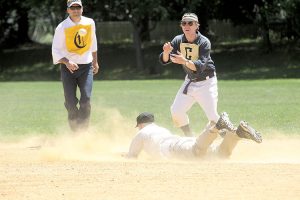
The majority of teams are comprised of around 15 to 20 players who come from all different age groups. “The teams primarily, and our team is no exception, consist of players from late high school to close to 70, so it’s very inclusive,” said McIver. “Every team is full of guys who are pure baseball players, there are players that are pure historians and there’s a bunch of guys who are in the middle.”
Outfielder Dan Radel falls in the category of a historian. “This is like playing on a field of dreams,” said Radel, an adjunct history professor at Brookdale Community College.
Known by teammates as a “muffin,” a term given to the rookies, Radel, 40, of Brick, joined Monmouth Furnace after watching a game at The Spirit of the Jerseys state fair. “I first saw them playing at Monmouth Battlefield and thought to myself ‘I have to do this.’”
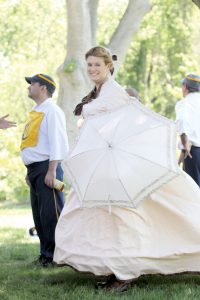
Sunday’s event, which was hosted by the Parker Homestead, would never had happened without Liz Hanson, secretary to The Parker Homestead-1665. Tasked with archiving the contents inside the Bates House after a pipe burst in February of 2015, which is across the street from the Parker Homestead, Hanson came across quite a find.
“I opened a cardboard box, it was full of hair, human hair,” Hanson said uneasily. “It was clean hair, but just wasn’t what I was looking for at the time.”
Beneath the hair was the real treasure. While preparing to throw the next item out, an old Christmas cookie tin, Hanson felt a rattle inside when she reached over to toss it into the garbage.
When she opened the tin, numerous cards were found inside, in remarkably good shape. “I don’t know much about baseball, but the first or second card that I looked at was Ty Cobb, and even I know who Ty Cobb was,” she said. “That’s when I knew there was something.”
Not only was there one Ty Cobb card, but a second was found in the collection. Additionally, fellow MLB Hall-of-Famer Christy Mathewson’s card was buried in the cookie tin.
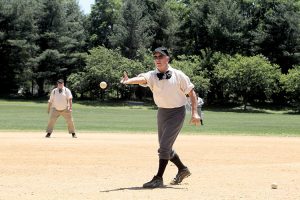
“lemon peel” ball, a softer version of the modern baseball.
“It’s not the ones that are hyper expensive, like a Honus Wagner from 1909 in certain series’ is worth two to three million dollars,” Sickles said. “But this collection is worth maybe 20 to 30 thousand.”
In total, Hanson salvaged the 24 Philadelphia Caramel Co. cards, and on Sunday, they were on display inside the Parker Homestead. The collection dates back to 1909 and is thought to be of Stan Parker’s collection. He was a relative of Julia Parker, who passed away in 1996 as the last owner of the house.
“I have not been to a game like this before, but I think it’s really cool to see the old uniforms,” said Sue Goldberg, 68 of Highlands. “I need to get a picture of these guys just milling about.”
Goldberg, an avid baseball card collector with a collection into the hundreds, gazed at the pair of Ty Cobb cards under the display case. “I hadn’t seen it until I was at Archives Day, except for on the internet and books, but not in person.”
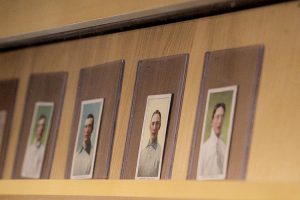
The game between Monmouth Furnace and the Chesapeake Nine was competitive into the bottom of the ninth inning, with the Nine’s pulling out a win for a final score of 14-11. After the game, McIver lined players up from both teams along the first and third baselines to thank Sickles Market, The Parker Homestead and the nearly 150 fans in attendance, finishing off with a collective “Hip Hip, Huzzah!” cheer from the players.
Monmouth Furnace Base Ball Club has ten remaining games on their schedule for this season, which lasts until October 8. For additional information about Monmouth Furnace Base Ball Club, visit their Facebook page. For updates on The Parker Homestead regarding future construction and events, visit ParkerHomestead-1665.org.














